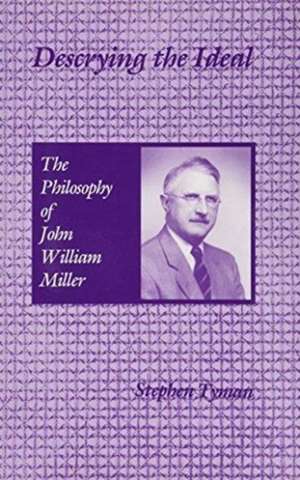Descrying the Ideal: The Philosophy of John William Miller
Autor Associate Professor Stephen Tymanen Limba Engleză Hardback – 30 apr 1993
Stephen Tyman introduces the thought of the late philosopher John William Miller and the unique conception of idealism he contributed to the philosophical tradition.
A longtime Mark Hopkins Professor of Intellectual and Moral Philosophy at Williams College featured prominently in Joseph Epstein’s Masters: Portraits ofGreatTeachers, John William Miller is now represented by five volumes, only one of which was published during his lifetime. The four posthumous volumes have been compiled by George Brockway, who has skillfully edited certain of Miller’s archival writings into thematically structured works. The Miller Archive, housed in the library of Williams College in Williamstown, Massachusetts, is a massive collection of papers written for widely various occasions, often in the form of personal letters, and composed over the course of six decades. The collection includes many fragments, a great deal of occasional material, and much duplication.
Tyman has based his study on the published writings and on his own extensive research in the Miller Archive. He places Miller firmly in the German idealist tradition of Kant and Hegel, while showing that Miller’s "historical idealism" furnishes a strikingly novel version of this philosophy. Tyman begins with Miller’s most original concept, that of the "midworld," which orients the entirety of Miller’s thinking and represents what may be the only successful resolution of the famous problem of "dualism" that has vexed modern philosophy since Descartes in the seventeenth century. Tyman offers a careful comparison of Miller’s ethics with that of Kant, which leads naturally into a similar treatment of Miller’s extensive reflections on "the philosophy of history."
Throughout his discussion, Tyman emphasizes the aptness of Miller’s conception of idealism in relation to contemporary discussion on a wide range of problems, and particularly upon the historical background of the conceptual problems that, both within and without classical idealism, have motivated the questions that characterize the contemporary situation. He has organized the book into chapters that cover the areas that Miller himself had marked off as central, showing how and why this centrality is conceived, and how it constitutes a revision of long-standing cognitive attitudes that have led to an impasse between idealism and its opponents, to the detriment of each. In particular, conceptions of causality, of morality and free will, of metaphysics and epistemology are subjected to critical review, as a wholly new vantage point concerning the nature of the philosophical enterprise arises.
A longtime Mark Hopkins Professor of Intellectual and Moral Philosophy at Williams College featured prominently in Joseph Epstein’s Masters: Portraits ofGreatTeachers, John William Miller is now represented by five volumes, only one of which was published during his lifetime. The four posthumous volumes have been compiled by George Brockway, who has skillfully edited certain of Miller’s archival writings into thematically structured works. The Miller Archive, housed in the library of Williams College in Williamstown, Massachusetts, is a massive collection of papers written for widely various occasions, often in the form of personal letters, and composed over the course of six decades. The collection includes many fragments, a great deal of occasional material, and much duplication.
Tyman has based his study on the published writings and on his own extensive research in the Miller Archive. He places Miller firmly in the German idealist tradition of Kant and Hegel, while showing that Miller’s "historical idealism" furnishes a strikingly novel version of this philosophy. Tyman begins with Miller’s most original concept, that of the "midworld," which orients the entirety of Miller’s thinking and represents what may be the only successful resolution of the famous problem of "dualism" that has vexed modern philosophy since Descartes in the seventeenth century. Tyman offers a careful comparison of Miller’s ethics with that of Kant, which leads naturally into a similar treatment of Miller’s extensive reflections on "the philosophy of history."
Throughout his discussion, Tyman emphasizes the aptness of Miller’s conception of idealism in relation to contemporary discussion on a wide range of problems, and particularly upon the historical background of the conceptual problems that, both within and without classical idealism, have motivated the questions that characterize the contemporary situation. He has organized the book into chapters that cover the areas that Miller himself had marked off as central, showing how and why this centrality is conceived, and how it constitutes a revision of long-standing cognitive attitudes that have led to an impasse between idealism and its opponents, to the detriment of each. In particular, conceptions of causality, of morality and free will, of metaphysics and epistemology are subjected to critical review, as a wholly new vantage point concerning the nature of the philosophical enterprise arises.
Preț: 172.98 lei
Preț vechi: 220.70 lei
-22% Nou
Puncte Express: 259
Preț estimativ în valută:
33.10€ • 34.52$ • 27.51£
33.10€ • 34.52$ • 27.51£
Carte indisponibilă temporar
Doresc să fiu notificat când acest titlu va fi disponibil:
Se trimite...
Preluare comenzi: 021 569.72.76
Specificații
ISBN-13: 9780809318407
ISBN-10: 0809318407
Pagini: 168
Ilustrații: 1
Dimensiuni: 140 x 216 x 16 mm
Greutate: 0.06 kg
Ediția:1st Edition
Editura: Southern Illinois University Press
Colecția Southern Illinois University Press
ISBN-10: 0809318407
Pagini: 168
Ilustrații: 1
Dimensiuni: 140 x 216 x 16 mm
Greutate: 0.06 kg
Ediția:1st Edition
Editura: Southern Illinois University Press
Colecția Southern Illinois University Press
Notă biografică
Stephen Tyman is an associate professor of philosophy at Southern Illinois University at Carbondale.
